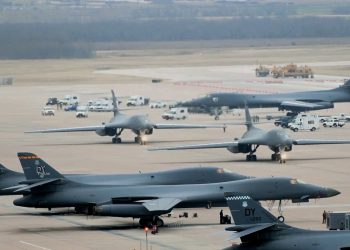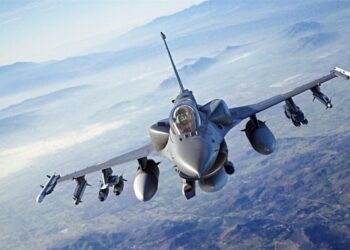US Air Force, OFFUTT AIR FORCE BASE: The Air Force's increased operations tempo is putting a strain on aircraft and Airmen, said the Air Combat Command commander at a conference at Offutt Air Force Base.
Gen. Ronald E. Keys, addressing 150 ACC leaders gathered at Offutt AFB, said increased flying hours on aging airframes are a challenge facing the entire Air Force inventory.
More worrisome at times than the increase in flying hours is the impact hostile environmental conditions is having on various aircraft components, General Keys said.
“We don't yet know what unseen effect the fine dust and extreme desert heat will have and what kind of toll that's going to take down the road,” he said.
Coping with these unforeseen issues requires the Air Force to balance its resources between fighting today's wars, looking forward to and preparing for tomorrow's threats, and developing future technologies to more effectively and efficiently accomplish the Air Force mission, General Keys said.
Striking the balance for finite resources between these often competing priorities was one of the main focuses of the ACC Commanders' Conference.
Despite the hard work and dedication of Air Force maintainers, increased operations tempo does take a toll on aircraft.
“We're riding these aircraft hard and the (55th Wing's) RC-135 (Rivet Joints), on average, are 45 years old and its E-4Bs are 35 years old,” he said.
Another area on which senior leaders at this conference and throughout the Air Force are also focusing is the “In Lieu Of” taskings Airmen are performing. These ILO taskings have Airmen performing traditional Army and Marine Corps specialties.
The Air Force has between 5,000 and 8,000 Airmen on the ground in Iraq and Afghanistan doing just that, the general said. While not all taskings take Airmen out of their area of expertise, the majority require Airmen to become proficient on unfamiliar tasks that they will not use at their home stations when they return.
Often because these Airmen have been performing a task other than their normal duty, they are required to undergo recertification for their own specialty.
The four-star general said if the Air Force is routinely given ILO positions to fill, it effectively costs the service three times as much in manpower when you consider the training, preparation and recertification for Airmen being sent downrange, those just returned home and those preparing to deploy.
“This creates a strain on the entire force, not just those filling these positions,” he said. “We must watch closely to ensure we're not getting to the point where we can't maintain the job the Air Force needs to do. It's a challenge, since we're trying to reduce the size of the Air Force.”
This challenge however, is only temporary, General Keys said, and it gives the Air Force an opportunity to contribute to the joint forces by providing much needed relief for the Army and Marine Corps who are deployed in large numbers on the ground. It also gives those services the opportunity to reorganize and adapt their forces for the ever-evolving situation on the ground.
US bomber joins air drill with South Korea, Japan
South Korea, Japan, and the United States on Sunday conducted a joint air drill involving a heavy bomber, Seoul's military...









